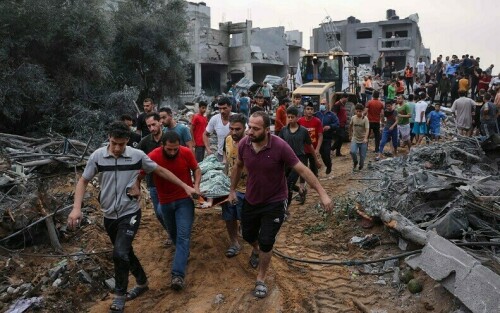With Israel cutting access to clean water, food, and essential medical supplies, 120,000 pregnant women in Gaza are enduring a heart-breaking situation.
According to a report by United Nations Population Fund (UNFPA), around 160 women give birth every day amid the chaos and fighting, while an estimated 45 women are said to have died with babies still living in their wombs.
“Every time there is bombing, I am terrified. My legs are paralysed, I can’t walk, I can’t move, especially since I have children and I need to get up to run so that they stay safe. I fear for them and my unborn child,” a Gazan woman on condition of anonymity told UNFPA.
“I am due this month, and I sleep on streets. My chest hurts, I have a runny nose and cough. There is no water at all. We try to wash our food, but the water is not clean. The most pressing issue right now is to clean the toilets,” she added.
Additionally, the difficulties with menstrual hygiene are worsening, pushing women to resort to chemical solutions to delay their periods due to the unavailability of sanitary products.
According to midwives, mothers in the region are at risk of not receiving treatment for the “big five” factors that contribute to stillbirths, newborn deaths, and maternal mortality: haemorrhage, infection, ruptured ectopic pregnancies, and untreated pre-eclampsia and eclampsia, reported by CBC News.
In several videos released by international media and people exclusively covering crisis in Gaza, pregnant women in hospitals can conceive a child only through normal delivery since there are no resources available for an operation. In a video made by Motaz Azaiza which was later taken down by Meta, women are also dying due to blood loss post-birth. Most women are also experiencing episodes of seizures during pregnancy due to continued trauma of war.
“It’s critical that every birthing person is attended to by a health-care or provider who’s skilled in emergency obstetric and newborn care and who has access to those basic life-saving medications,” said Alixandra Bacon, a registered midwife and co-leader of global and international health at the University of British Columbia.
“In all of those cases, you need not only a health-care provider, but you might need electricity, you need clean running water — and access to all of those things is been stripped away at this time.”
The International Federation of Midwives has also pointed out that Gazan women face a higher likelihood of experiencing sexual violence, unintended pregnancies, and exposure to sexually transmitted diseases in times of conflict.
According to the federation, midwives are among the healthcare workers who have made the decision to delay their evacuation and remain in Gaza. They are putting themselves in danger to assist mothers during pregnancy and childbirth. International law, including the fourth Geneva Convention, mandates that healthcare facilities and personnel striving to save civilian lives should be safeguarded and left unharmed during times of war.
Dr Yara M Asi, an assistant professor at the University of Central Florida’s School of Global Health Management, who has collaborated with Amnesty International on policy reform and outreach, has dedicated years to documenting the healthcare challenges in the occupied Palestinian territory. She has gathered information through focus groups and on-site interviews. Dr Asi revealed that she has been receiving distressing updates from colleagues and students in Gaza in recent days in an interview with The Cut.
“The updates are harrowing. Hospitals are getting a thousand new patients per day, many with traumatic injuries. They’re running out of basic dressing and gauze, using cloths and rags and blankets to tourniquet people’s wounds. I’ve heard from physicians that they’re performing emergency surgeries without anaesthetics because they don’t have any,” she said. “They’re starting to worry about potential infection rates because their sterilisation machines don’t have power. The conditions are unsanitary because people are splayed everywhere,” she added.
Published in Dawn, October 24th, 2023
















































